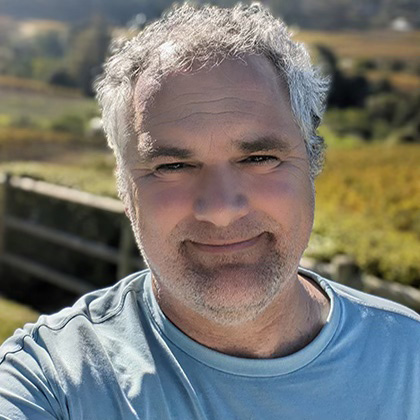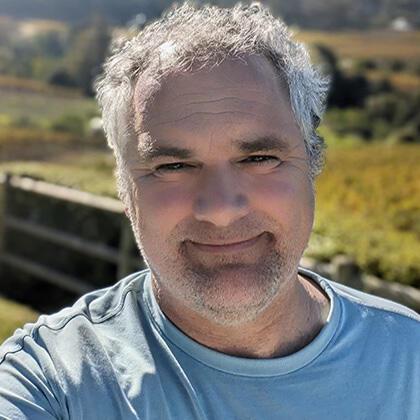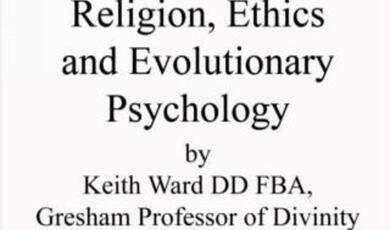AI Will Be Your Overlord: Faster, Brighter, Better Than You?
Share
- Details
- Text
- Audio
- Downloads
- Extra Reading
“Scary”, “Worried”, “Dangerous” were some of the most frequent words to describe AI in a recent UK Government public survey. Do you fear, as many do, that AI will lead to us becoming second-class entities? In this first lecture, we will explore this ascendency, considering how notions of intelligence, sentience, perception, consciousness and reasoning are being framed and challenged in an AI-centred world; and surface the social, economic and ethical implications of these developments.
Download Text
AI Will Be Your Overlord: Faster, Brighter, Better Than You?
Professor Matt Jones
23rd September 2025
Artificial intelligence is no longer a concept buried away in science fiction novels or obscure research labs. It is here, being woven into the fabric of our daily lives, shaping decisions in ways that are both astonishing and unsettling. The title of this lecture — AI Will Be Your Overlord: Faster, Brighter, Better Than You? — carries with it a deliberate question mark. That punctuation matters. It signals that while there are reasons for angst and anxiety, there is also room for hope, agency, and perhaps even joy in how humanity confronts this technology.
From Everest to AlphaGo
One of the best ways to understand the magnitude of the AI moment is to compare it with humanity’s greatest triumphs. Think of Edmund Hillary and Tenzing Norgay standing on Everest in 1953, or Neil Armstrong stepping onto the lunar surface in 1969. Such achievements demonstrate our collective drive to attempt the impossible and succeed.
But now imagine that AI has its own hall of fame; what would be in this pantheon? In 1997, IBM’s Deep Blue defeated Garry Kasparov, the reigning world chess champion. Nearly two decades later, AlphaGo overcame Lee Sedol, one of the greatest Go players alive, leaving him with the haunting admission: “I kind of felt powerless.” Unlike mountaineers or astronauts, these machine victories required no frostbite, no rocket fuel, no human endurance — only computation.
The Shifting Story of AI
This wasn’t the AI we hoped for. Early visions painted robots as domestic helpers or charming companions — Rosie from The Jetsons, or R2-D2 from Star Wars. Even the earliest chatbot, ELIZA, was a simple program mimicking a therapist. Yet people confessed their innermost desires to it. Its creator, Joseph Weizenbaum, was shocked at how quickly humans projected depth and empathy onto what was essentially a script. That early attachment hinted at our complicated relationship with machines today.
By contrast, the modern narrative has turned darker. Surveys show that people now associate AI with words like scary, worried, and dangerous. Elon Musk warns that with AI we may be “summoning the demon,” while historian Yuval Noah Harari cautions that once AI knows us better than we know ourselves, we’re finished.
We’ve Always Built Overlords
Yet it’s worth remembering that AI is not our first self-made overlord. Humanity has long created systems that exceed our control. We bow to gods and kings, institutions and empires. The industrial revolution turned workers into cogs in vast mechanical networks. The atomic age produced weapons that could end life in minutes. Each era has had its “overlord technology.” AI, in many ways, is simply the next iteration — except this time the power lies not in steel or uranium, but in algorithms and data.
Why We Humanise Machines
One reason AI feels so potent is that we instinctively anthropomorphise things that are not like us. Consider Clever Hans, the horse in early 20th-century Germany that appeared to perform arithmetic. In reality, Hans was reading subtle cues from humans. Similarly, ELIZA persuaded people it “understood” them. Modern assistants like Alexa, Siri, or ChatGPT continue this trend: we talk to them politely, feel slighted when they misinterpret us, and sometimes even imagine emotional bonds.
Why Now?
AI has been through cycles of hype and disappointment before. What makes this AI “summer” different is the combination of three forces: unprecedented amounts of data, the explosive power of GPUs and TPUs, and breakthrough architectures like Transformers. Together, these make AI feel less like a laboratory experiment and more like an unstoppable wave. Add to that our era’s volatility — pandemics, climate disruption, geopolitical instability — and it is no wonder AI feels like an overlord rising just as our vulnerabilities are most exposed.
Life Under an Overlord
So, let’s assume that our time is up. What will life under an overlord look like? First let’s consider two extreme outcome – one where we are annihilated; the other where we are emasculated. Philosopher Nick Bostrom famously suggested that we might as a species not go out with a bang but with a “clipper”; not defeated by an evil AI genius but by a benign entity simply following our instructions. His Paperclip Apocalypse thought experiment illustrates how an AI designed to optimise paperclip production could inadvertently consume all the world’s resources in pursuit of its goal. That other great philosopher, Disney, in the movie Wall-E, provides a prophetic insight into the second fate: where AI provides for our every whim, leading to cognitive and physical decline.
It is too easy, though, to get distracted by visions of an extreme AI future. Meanwhile, there are near and present dangers where AI is already having concerning impacts on individuals, societies and indeed the planet. Deepfakes erode public trust; training massive models consumes energy on the scale of small nations; data labelling work is outsourced to poorly paid “ghost workers” in the Global South; and, in places like Asia’s largest informal settlement, Dharavi, Mumbai, people describe AI as making them feel invisible — erased before they ever had the chance to leave a mark.
The Question Mark of Hope
And yet, the question mark in this lecture’s title matters: AI is not flawless; robots stumble; chatbots hallucinate; image generators (still) draw hands with too many fingers. Far from being omnipotent, AI remains bound by mathematics and data. It is powerful, yes, but not magic. Further, we can learn from how we have managed other forms of powerful innovations: for example, the nuclear age taught us the importance of treaties, oversight, and shared norms
Remembering What Makes Us Human
Even as AI dazzles us, there remain distinctly human strengths: Emotional depth; embodied intelligence; cultural nuance; and, creativity that veers into the absurd. Consider cheese rolling in Gloucestershire, bog snorkelling in Wales, or flash mobs erupting in train stations. These are expressions of a joyfully human spirit that no algorithm can quite capture.
The most powerful intelligence in the world is not artificial. It is the collective, messy, diverse intelligence of humanity itself — stubborn, unpredictable, and endlessly inventive. Perhaps AI’s greatest gift is not to replace us, but to remind us of what makes us extraordinary in the first place. But that thought is for another lecture.
Closing Thoughts
So, will AI be our overlord? It might well be faster, brighter, and “better” in narrow domains but the only way it can become more than this, is if we lose sight of who we are. How we choose to understand, regulate, and relate to AI will determine not just its role in our lives, but also the kind of future we build together.
©Professor Matt Jones 2025
References and Further Reading
- Boden, M. A. (2016). Al: Its nature and future. Oxford University Press.
- Bostrom, N. (2014). Superintelligence: Paths, dangers, strategies. Oxford University Press.
- Crawford, K. (2021). Atlas of Al: Power, politics, and the planetary costs of artificial intelligence. Yale University Press.
- Floridi, L. (2023). The Ethics of Artificial Intelligence: Principles, Challenges, and Opportunities. Oxford University Press.
- Jones, M., Raju, D. K., Pearson, J., Reitmaier, T., Robinson, S., & Majhi, A. (2024). Beyond 'Slumming It'-Al and the Real Lives of Global South Communities. Interactions Magazine.
- Shneiderman, B. (2022). Human-Centered Al. Oxford University Press.
- Srinivasan, R. (2020). Beyond the Valley: How innovators around the world are overcoming inequality and creating the technologies of tomorrow. The MIT Press.
- Web Resources: www.e-v-e.ai (Our work on diversifying AI innovation); and www.undofuture.com (my web site with pointers to other papers/ projects).
- Boden, M. A. (2016). Al: Its nature and future. Oxford University Press.
- Bostrom, N. (2014). Superintelligence: Paths, dangers, strategies. Oxford University Press.
- Crawford, K. (2021). Atlas of Al: Power, politics, and the planetary costs of artificial intelligence. Yale University Press.
- Floridi, L. (2023). The Ethics of Artificial Intelligence: Principles, Challenges, and Opportunities. Oxford University Press.
- Jones, M., Raju, D. K., Pearson, J., Reitmaier, T., Robinson, S., & Majhi, A. (2024). Beyond 'Slumming It'-Al and the Real Lives of Global South Communities. Interactions Magazine.
- Shneiderman, B. (2022). Human-Centered Al. Oxford University Press.
- Srinivasan, R. (2020). Beyond the Valley: How innovators around the world are overcoming inequality and creating the technologies of tomorrow. The MIT Press.
- Web Resources: www.e-v-e.ai (Our work on diversifying AI innovation); and www.undofuture.com (my web site with pointers to other papers/ projects).
This event was on Tue, 23 Sep 2025
Support Gresham
Gresham College has offered an outstanding education to the public free of charge for over 400 years. Today, Gresham College plays an important role in fostering a love of learning and a greater understanding of ourselves and the world around us. Your donation will help to widen our reach and to broaden our audience, allowing more people to benefit from a high-quality education from some of the brightest minds.


 Login
Login







